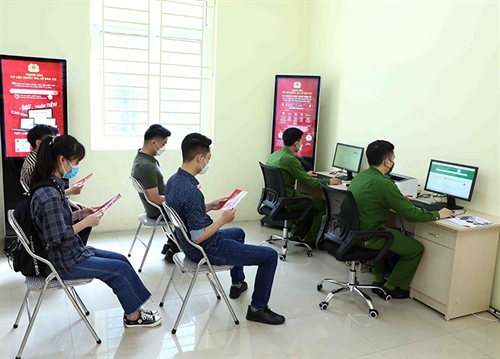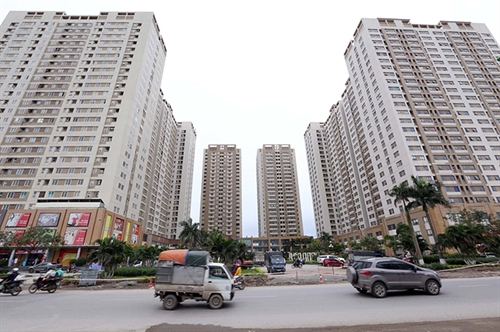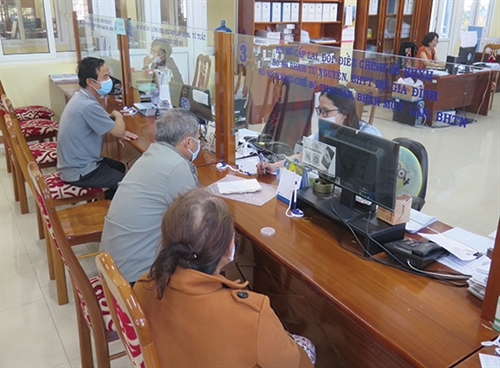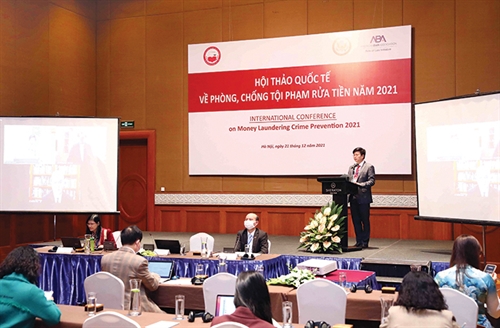Immigrants from other localities who wish to register a legal domicile in Hanoi would have to rent or borrow a house with a floor area of at least 20m2 per person, according to a draft resolution of the municipal People’s Council.
The draft resolution, which has been recently released by the municipal administration of the capital city, provides the minimum space standards for registration of legal domicile at rented or borrowed property in the city.
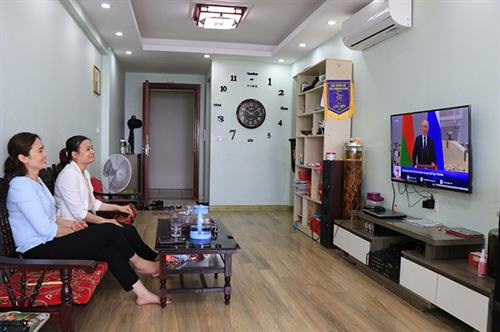 |
| A Hanoian family in their apartment in the capital city__Photo: Thanh Thuong/VNA |
The draft stipulates that for the houses which used to be state-owned houses and are lent or leased to current tenants by state agencies or houses currently in use by tenants under lease contracts signed with the Hanoi Housing Development and Management Company, the minimum space standard would be 8m2/person. As for houses of other types, the average floor area must be at least 20m2/person
The Hanoi municipal administration’s proposal is made in line with Article 20.3 of the 2020 Law on Residence which states that citizens may register their legal domicile at rented or borrowed property if meeting both the following conditions: (i) obtaining the consent of the owner of the property and (ii) satisfying the minimum space standard set by the provincial-level People’s Council, which, however, must not be less than 8m2/person.
Obviously, there is nothing to discuss about the minimum space standard of 8m2/person applicable to tenants who rent houses from state agencies or the Hanoi Housing Development and Management Company. The controversial point lies in the required minimum floor area of 20m2/person to be imposed on those who rent houses of other types.
Talking to Tuoi Tre Online, lawyer Nguyen Tien Lap from the NHQuang & Associates Law Office said the proposal is seemingly discriminatory.
“According to Articles 22 and 23 of the 2013 Constitution, every citizen has the right to a lawful residence and the right to free movement and residence within the country,” lawyer Lap said. Particularly, a citizen’s right to a lawful residence can be understood as the right to live in a house he/she owns or borrows or rents from others and the right to make temporary residence or permanent residence registration depending on his/her own will and conditions. The State is responsible for creating all legal and material conditions to guarantee the exercise of these rights.
Lap went on to analyze impacts of the Hanoi municipal administration’s tentative policy, if it is approved.
Firstly, the draft regulation imposing a minimum space standard of 20m2/person as a condition for a citizen to register permanent residence at rented or borrowed property would create a “technical barrier” that indirectly restricts the constitutional rights of people, especially the group of low-income earners who can hardly afford to buy a house in the capital city.
Secondly, the tentative policy also shows discrimination in favor of tenants of state-owned houses who would be subject to the space standard of just 8m2/person while those renting private houses must satisfy a much higher requirement of 20m2/person, both for the purpose of permanent residence registration.
Thirdly, the minimum space standard of 20m2/person seems too high and unrealistic given the current housing conditions in Hanoi. In fact, it is not easy for people to own a house; hence, many have to live in rented or borrowed property. Against that backdrop, the policy would make it difficult for many people to establish a stable place to live and work in the capital in the long run.
Fourthly, the proposal contradicts a current regulation which says that the minimum area required for a land plot in the inner city of Hanoi for grant of a land use rights certificate is 30m2. Assuming a family with two or more members rents a one-story house built on a 30m2 land plot, they would be unqualified to register permanent residence at such house. Given the necessity of permanent residence registration at present, for example, in enrolment to public schools, the family would probably move to a spacious place once their child(ren) reach(es) the school age.
So, the proposal, to some extent, could be seen as a form of restriction of land owners’ rights to use and dispose of their property, negatively affecting business activities and incomes of house lessors, thus forcing them to build multi-story houses to be able to rent them out. It would also hinder investment in building houses, e.g., mini-apartments, for rent.
Lastly, the 2020 Law on Residence empowers provincial-level People’s Councils to impose higher minimum space standards for the purpose of permanent residence registration, and the threshold of 8m2/person set in the Law, which has been carefully considered from different angles, is reasonable and now applied in many provinces and cities across the country. Hence, why does Hanoi have to establish such a high standard? It is not to mention the fact that once the proposal is approved, people stably living in rented or borrowed houses but unqualified to register permanence residence there would have to register temporary residence and then ask for extension of temporary residence registration on a periodical basis. This would increase the burden of administrative procedures on citizens while causing difficulties in residence management of state authorities.
In sum, the tentative policy designed by the Hanoi municipal administration lacks both scientific grounds and objective reasons for issuance and may cause harms to the rights and interests of low-income earners while benefiting apartment projects of large real estate investors. In addition, it may lead to a rise in house rental rates, thus increasing the cost of living for the majority of the population.
“Therefore, it is necessary to conduct independent regulatory impact assessment of the policy in accordance with the Law on Promulgation of Legal Documents before it is adopted,” lawyer Lap recommended.
The People’s Committee of Hanoi, in the latest move, has asked for permission from the municipal People’s Council to delay the submission of the draft resolution on the minimum space standards for registration of legal domicile at rented or borrowed property in the city, citing the reason of “ensuring compliance with regulations on the order of promulgation of legal documents.”


